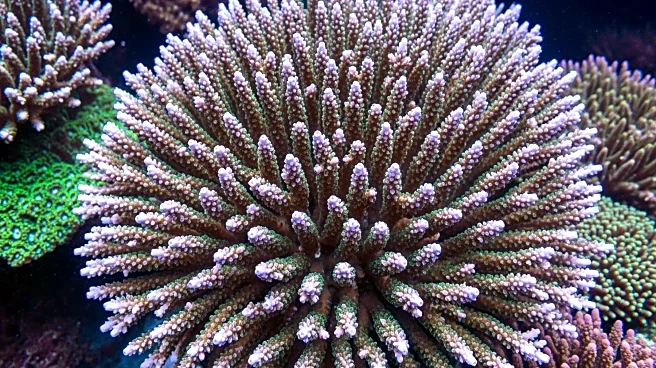What's Happening?
Researchers at the University of Pennsylvania have uncovered a unique mechanism in the red gorgonian coral, Leptogorgia chilensis, that allows its flexible arms to stiffen upon touch. This phenomenon, known as granular jamming, involves the coral's tissues
expelling water, causing the gel-like matrix to shrink and the mineral particles within to compact and lock into place. The study, published in the Proceedings of the National Academy of Sciences, suggests that this natural jamming system could inspire advancements in fields such as medicine, robotics, and manufacturing. The coral's skeleton, composed of calcium carbonate, demonstrates properties that could be adapted for human use, potentially leading to the development of synthetic mechanotunable materials.
Why It's Important?
The discovery of the coral's natural jamming system holds significant potential for various industries. By understanding and replicating the coral's ability to adjust stiffness, researchers could develop new materials for surgical instruments, robotic arms, and other applications requiring variable stiffness. This bioinspired approach could lead to more efficient and adaptable technologies, enhancing capabilities in medical procedures, manufacturing processes, and robotic designs. The study highlights the importance of studying natural systems to uncover innovative solutions for human challenges, potentially leading to breakthroughs in material science and engineering.
What's Next?
The research team plans to explore other soft coral species to identify different sclerite shapes and their potential properties. This could lead to the discovery of new material architectures for granular jamming systems. The findings may also inspire further studies into the mechanical performance of coral skeletons, providing insights into designing synthetic materials with improved strength and efficiency. As researchers continue to investigate the structural complexities of gorgonian skeletal architectures, the potential for developing innovative mechanotunable systems based on natural principles remains promising.
Beyond the Headlines
The study of coral's natural jamming system not only offers practical applications but also raises ethical and environmental considerations. As bioengineering advances, it is crucial to ensure that the exploitation of natural resources does not harm ecosystems. The research underscores the need for sustainable practices in material development, balancing technological progress with ecological preservation. Additionally, the study may contribute to a deeper understanding of marine biodiversity and the role of corals in oceanic ecosystems, highlighting the interconnectedness of natural and human-engineered systems.















